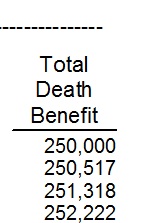- 1,405
I don't think a need for permanent insurance necessarily stops at retirement.
That's why I have some permanent insurance, to pay a death benefit WHEN I die.
But how could I possibly keep paying the premiums if I was not adequately prepared for retirement?
----------
Actually, that is exactly how life insurance companies pay commissions, based on Death Benefit.
News to me.
35 years in the business and I learned something brand new; or did I?

